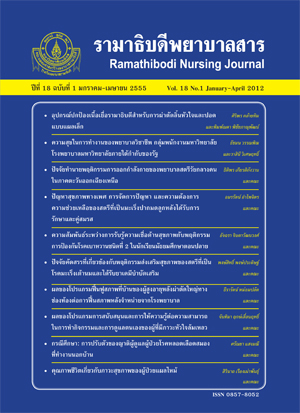กรณีศึกษา: การปรับตัวของญาติผู้ดูแลผู้ป่วยโรคหลอดเลือดสมองที่ทำงานนอกบ้าน
Main Article Content
Abstract
บทคัดย่อ
การศึกษาเชิงคุณภาพนี้มีวัตถุประสงค์เพื่อศึกษาการปรับตัวของญาติผู้ดูแลผู้ป่วยโรค หลอดเลือดสมองที่ทำงานนอกบ้านแบบรายกรณีคัดเลือกตัวอย่างแบบเจาะจง ได้ญาติผู้ดูแลสตรีที่สามารถปรับตัวได้ดีในการดูแลผู้ป่วยโดยไม่มีใครช่วยเหลือและสามารถทำงานนอกบ้านได้ดีจำนวน 1 ราย เก็บรวบรวมข้อมูลด้วยการสัมภาษณ์เชิงลึกพร้อมบันทึกเทป 3 ครั้ง โดยใช้แบบ สัมภาษณ์การปรับตัวของญาติผู้ดูแล และนำข้อมูลที่ได้ไปวิเคราะห์เชิงเนื้อหา ผลการศึกษาพบว่า ญาติผู้ดูแลสามารถปรับตัวได้ดีใน 4 ด้านดังนี้ 1) ด้านบทบาทหน้าที่ ญาติผู้ดูแลสามารถจัดการเวลาทำงาน เวลาดูแลผู้ป่วย กิจกรรมการดูแลผู้ป่วย งานบ้าน และจัดการการเงินได้อย่างเหมาะสมสอดคล้องกับเวลาทำงาน และเกิดความสมดุล 2) ด้านร่างกาย ญาติผู้ดูแลสามารถจัดการกับ การเปลี่ยนแปลงของร่างกายและจิตใจที่เกิดขึ้น และดูแลสุขภาพตนเองได้ดี 3) ด้านอัตมโนทัศน์ ญาติผู้ดูแลสามารถสร้างความเชื่อมั่นและความรู้สึกมีคุณค่าในตนเอง 4) ด้านการพึ่งพาระหว่างกัน ญาติผู้ดูแลสามารถหาแหล่งสนับสนุนทางสังคมที่สนับสนุนการดูแลผู้ป่วย นอกจากนี้ยังพบว่า ปัจจัยที่ทำให้ญาติผู้ดูแลปรับตัวได้ดีประกอบด้วย การเข้าใจถึงการเจ็บป่วยของผู้ป่วย สัมพันธภาพที่ดีของญาติผู้ดูแลกับผู้ป่วย และแหล่งสนับสนุนด้านรายได้และบุคคล อีกทั้งการปรับตัวได้ดียัง ขึ้นกับความสามารถ กระบวนการคิด และประสบการณ์ของญาติผู้ดูแลที่สนับสนุนให้สามารถดูแล ผู้ป่วยได้ดีและสามารถทำงานนอกบ้านได้ตามปกติ จากการปรับตัวที่ดีของญาติผู้ดูแลทำให้เกิด ผลลัพธ์ที่ดีคือ ญาติผู้ดูแลสามารถดูแลผู้ป่วยในขณะที่ยังทำงานนอกบ้านได้ โดยมีการจัดตาราง ชีวิตใหม่และรู้สึกภาคภูมิใจในตนเอง ที่สำคัญคือ ผู้ป่วยมีอาการดีขึ้น
คำสำคัญ: ญาติผู้ดูแลทำงานนอกบ้าน ผู้ป่วยโรคหลอดเลือดสมอง การปรับตัว กรณีศึกษา
Abstract
This qualitative study aimed to investigate a case study concerning the adaptation of a working caregiver to a stroke patient. Purposive sampling was used to select a case of a female caregiver who had good adaptation in caring for a patient without any assistance from others and who could work outside the home. Three in-depth interviews using the interview guide containing questions about the adaptation of a working caregiver with tape recording were used to collect data. Data were analyzed using content analysis. The findings revealed that the caregiver had good adaptation in 4 modes: 1) role function mode: the caregiver could appropriately and evenly manage her office time, time to care for the patient, activities to care for the patient, house work, and finances congruently with her working hours; 2) physiological mode: the caregiver could manage the physical and psychological changes and could take care of her health very well; 3) self-concept mode: the caregiver could build up her self confidence and self esteem; 4) interdependence mode: the caregiver could find sources of social support to carry on the care for the patient. In addition, it showed that factors that helped the caregiver have good adaptation consisted of understanding the illness of the patient, a good relationship between the caregiver and the patient, and good human and financial resources. Besides, good adaptation depended on the ability, thinking process, and experience of the caregiver that supported her to take good care of the patient and to work outside the home as usual. The good adaptation of the caregiver resulted in the caregiver’s ability to care for the stroke patient while continuously working outside the home by arranging a new life schedule and feeling proud of herself. Importantly, the patient’s condition had improved.
Keywords: Working caregiver, Stroke patient, Adaptation, Case study
Article Details
บทความ ข้อมูล เนื้อหา รูปภาพ ฯลฯ ที่ได้รับการตีพิมพ์ในรามาธิบดีพยาบาลสาร ถือเป็นลิขสิทธิ์ของวารสาร หากบุคคลหรือหน่วยงานใดต้องการนำทั้งหมดหรือส่วนหนึ่งส่วนใดไปเผยแพร่หรือเพื่อกระทำการใด ใด จะต้องได้รับอนุญาตเป็นลายลักษณ์อักษรจากรามาธิบดีพยาบาลสารก่อนเท่านั้น


